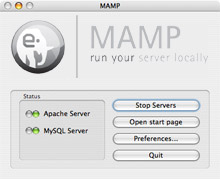Those who pay close attention to the various projects that I get myself involved with will notice that I like to play around with the design of the sites. Call it whatever you want, but it always seems like there is something better that I can add or change to the way a site looks. It’s all apart of learning. You try to do something the old or stupid way, only to discover there is a new way that all the cool kids are using that makes things so much more simple.
The worst part about changing a lot of things is doing them publicly. You just can’t go in with an idea, make the change, and go about your business. When you are restless as I am, and I know there are lots of people out there with similar mindsets, the idea you tryout might not look as good as you originally thought. Even worse, it mucks up the whole site and makes it not function at all. Not a good thing, so you might try something else or go back to the way it was in the first place.
 MAMP has really helped with that. It’s allowed me to install and run numerous test sites of WordPress locally[wordpress]. I play around and change things on the fly. Install plugins and surf the site in a browser with full function. Everything that MAMP can do is already there on the Mac(Apache, MySQL, and PHP) these days, but this application makes it work with far less headache. Launch it, do your work, and you’re golden. When I’m settled with what I want, the site goes into the wild.
MAMP has really helped with that. It’s allowed me to install and run numerous test sites of WordPress locally[wordpress]. I play around and change things on the fly. Install plugins and surf the site in a browser with full function. Everything that MAMP can do is already there on the Mac(Apache, MySQL, and PHP) these days, but this application makes it work with far less headache. Launch it, do your work, and you’re golden. When I’m settled with what I want, the site goes into the wild.
Lately, I’ve been experimenting with WordPress 2.1, and the changes to the next version are looking promising. Drupal can also be managed this way. That took me a little more thinking to get that sorted out, but I was working without an explicit, step-by-step tutorial for MAMP.
I’ve also tried to install WordPress MU, but stopped short of being successful. Actually, I hit some snags and simply gave up. Some quick searches for solutions came up short, but I know that it can work with MAMP. Will have to give it another shot in the near future.
Tricks of the trade, and this might be more obvious to some. I figured I’d share because this has made work on my projects easier, especially taking that FTP part out of the equation. There are various ways to do local installs for WordPress and Drupal development for the Mac and PC, but I can seriously vouch for this one.

